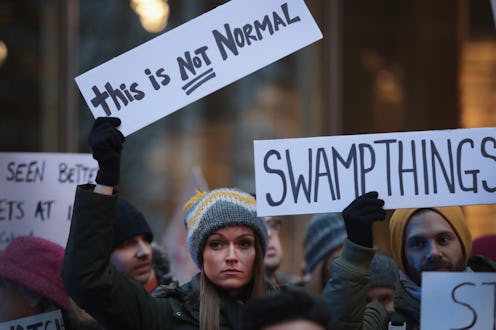News
The One Thing You Should Do If You Didn't Vote

The 2016 presidential election seemed to completely dominate the nation's attention for months, but the constant news coverage didn't work on everyone. Only 55 percent of voting aged Americans cast their ballots in (or before) November, one of the lowest turnout rates in recent history. If you didn't vote in this election, you've got some atoning to do, because democracy only works when the demos, the people, are informed and engaged. Here's the one thing you should do now if you didn't vote, because if you didn't make it happen on your own, you might just need a little help.
Support groups have been proven extremely effective in many types of situations, like weight loss, grieving, and therapy. Staying politically up to date can also be a tough experience that you need help slogging through, especially if the next election cycle is anything like the last. News can be really stressful, but with a group of friends by your side helping to filter, interpret, and make sense of politics, you can make voting a more approachable concept. Forming a political support group could be a great way to make sure you and others who didn't vote help each other make informed voting decisions in the future.
Start by reaching out, personally or through social media, to gauge interest, and specifically look for people who also didn't vote. Everyone should have space to form their own opinions on the political climate without a strong force pushing the group one way or the other. Once you have even one partner, you can start figuring out what prevented you from voting and how you make sure it doesn't happen again. Your setting could be as informal as an active group chat to send each other news and discuss concerns, or regular in-person meetings to talk about action plans.
The next step is figuring out where to actually find information. This election cycle was rampant with fake news and horserace reporting, but there's a lot more going on in the political world than just the stuff that makes the biggest headlines. Here's a brief list of political resources you should know about to understand how elections work and what's going on in politics.
- RealClearPolitics.com — RCP aggregates all the latest polling information, even when it's not election time. It also combines news articles from lots of other sites from many different types of political sources, so it's a good, well-rounded place to get your political news from too.
- Politifact.com — This non-partisan site fact-checks politicians' claims to check for honesty and accuracy.
- OpenSecrets.org — If you worry about campaign finance and sketchy donations, you can fact check all candidates' financial documents here.
- GovTrack.us — GovTrack lets you see what bills congressional representatives sponsor and vote for, to help you figure out whether reelecting them is worth it. This one will be crucial for the midterms in 2018.
- FiveThirtyEight.com — Founded by statistician Nate Silver, the site is named after the 538 members of Congress. It produces in-depth statistical analyses of various politial and social issues, but you can still easily understand it without a background in stats.
- OnTheIssues.org — OnTheIssues presents politicians' public comments broken down by subject, making it easy to see exactly what they've said about big political issues.
- TheGreenPapers.com — This is one of the most comprehensive sources for information on the delegate selection and allocation process on the internet.
No matter what happens in the next two years, stay dedicated and make it to the polls in November 2018. This is not the time to turn a blind eye toward politics — the nation's future is being decided right now, and taking a stand one way or the other is far more admirable than being a passive bystander while history unfolds before you. Join in, get support, and commit to your duty as a citizen, because the American experiment fails unless everyone participates.